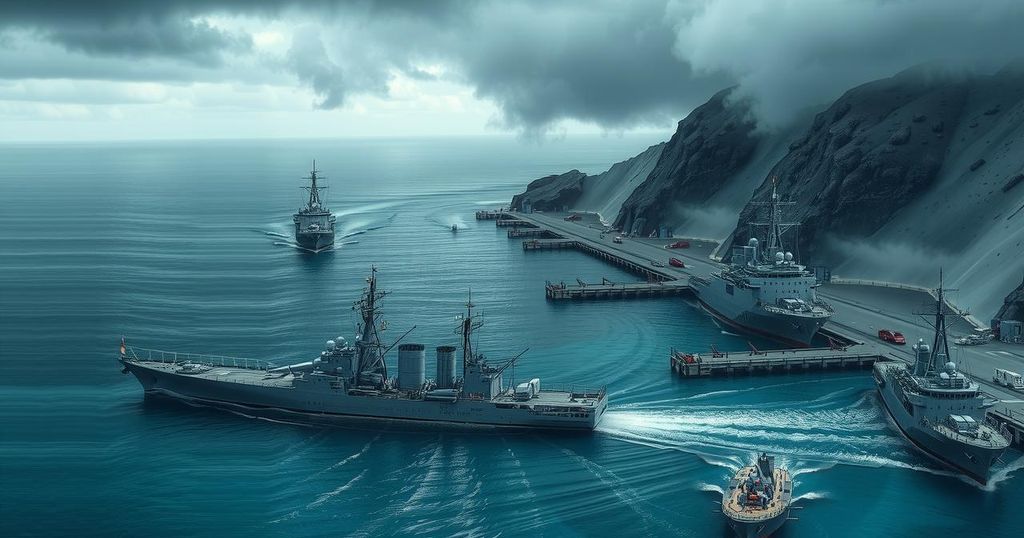Sudan’s Military Advances in Civil War Amid Foreign Support and Humanitarian Crisis

Sudan’s military has retaken the presidential palace in Khartoum, highlighting a dramatic shift in the ongoing civil war, attributed to foreign support predominantly from Russia and Iran. The RSF has struggled with governance and logistics, while the humanitarian situation worsens, resulting in widespread displacement and casualties. Regional powers remain heavily involved, influencing the conflict’s direction and the humanitarian crisis deepens.
After enduring nearly two years of conflict, Sudan’s military has regained the presidential palace in Khartoum, marking a pivotal moment in its civil war against rival paramilitary forces. Video footage shows jubilant soldiers celebrating within the damaged palace, solidifying a significant military achievement. While this victory does not conclude the civil war, it illustrates a significant shift in power, as the military previously struggled amidst significant territorial losses since April 2023.
The army’s resurgence can be attributed to external support from nations such as Russia and Iran, which have provided both arms and financial resources. As the once-dominant Rapid Support Forces (RSF) have become strained in governance and supply logistics, the Sudanese army has leveraged these materials to reclaim lost ground in various regions. An army statement declared its intention to “cleanse every inch of our country from the filth of this militia and its collaborators.”
The civil war erupted from a deep-seated rivalry between General Abdel Fattah al-Burhan, the de facto president, and General Mohamed Hamdan Dagalo, known as Hemedti. This conflict has escalated into a humanitarian crisis, with millions displaced and casualty estimates ranging from 150,000 to 500,000. The international community remains engaged, as various regional powers support different factions for influence over natural resources and strategic positions.
Inevitably, the UAE has faced allegations of supporting the RSF against the army, driven by concerns about the army’s proximity to political Islamists and interests in gold-rich areas controlled by the RSF. Although the UAE has rejected these claims, the Sudanese army has turned to historical allies, including Russia and Iran, as it faced isolation from Western support.
Russia’s interest in Sudan has intensified, particularly its strategic desire for a naval base on the Red Sea, as well as access to Sudan’s gold mines. The Kremlin had initially attempted to back both warring factions but ultimately chose to support the Sudanese army. Tehran, having previously severed ties with Sudan, is now also seeking to extend its influence in the Red Sea region. Both countries reportedly provide military assistance, including the supply of advanced drones.
A recent counter-offensive initiated by the army has led to a series of victories, rekindling their combat capabilities. Ahmed Al-Nour, an army officer, noted their initial unpreparedness, indicating a subsequent surge in recruitment and community mobilization efforts. He stated that the RSF is significantly weakened due to the army’s encirclement and supply line disruption.
Experts have observed the increasing use of sophisticated drone technology in this conflict, attributing some of the army’s successes to the support from Russia and Iran. However, some caution against exaggerating the tactical advantages inherent to technology, emphasizing instead the successful recruitment of militia forces as a critical factor.
Recent reports indicate that a final agreement has been established for Russia to deploy a naval base in Sudan, further aligning shared interests. As the battlefield dynamics evolve, the Kremlin seems more focused on safeguarding its strategic interests rather than favoring one faction over another.
Amidst the turmoil, many Sudanese civilians perceive the army as a lesser evil, as both factions have committed human rights abuses. The International community highlights extreme violence, including mass sexual assault. Residents like Issra Hassan, a concerned mother from Khartoum, depict an increasingly unpredictable and dangerous environment, expressing despair over escalating violence and arbitrary enforcement by armed forces. She remarked on the alarming randomness of recruitment practices and the resulting insecurity faced by local communities, emphasizing the pervasive fear resonating throughout certain neighborhoods.
In summary, Sudan’s military has regained strategic control in the ongoing civil war, significantly aided by foreign support from Russia and Iran. This victory marks a crucial turn in the conflict, despite the persistent humanitarian crisis and ongoing combat. As international attention intensifies on this conflict, particularly concerning human rights violations, the power dynamics remain complex, with strategic interests influencing military engagements from multiple nations. Civilians continue to suffer amid rising instability and violence, casting a shadow over any potential outcomes in this prolonged struggle for control and governance.
Original Source: www.telegraph.co.uk







